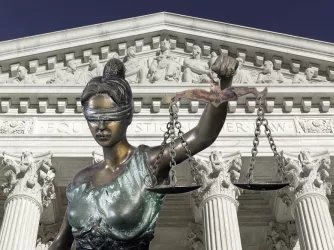Table of Contents
BACK TO SCHOOL: Is Your School Censoring Your Speech? Think About Making a Federal Case Out of It.

During the summer, many college administrators take advantage of the relative quiet to work on revising their policies. Sometimes the results are constructive, but often the news isn’t so good and students return to campus facing greater restrictions on their speech.
By all indications, many colleges and universities are battening down the hatches for this fall’s presidential campaign, mistakenly thinking that they can avoid controversy by stifling political speech. As my colleague Marieke Tuthill Beck-Coon explained earlier this week, the go-to justification for censorship is the myth that if students engage in political speech, the school will lose its tax-exempt status. Although the institution can’t advocate for a particular candidate, nothing stops students from doing so.
But for every action, there is an equal and opposite reaction. As some university officials become more determined to suppress controversial speech, we at FIRE are redoubling our efforts to make sure every student and faculty member can share their ideas freely—whether they be profound or trite; infuriating or reassuring; provocative or bland; right or wrong. All this week, we have highlighted how our different programs can help students and faculty defend their right to be heard during this election season and beyond.
FIRE’s Stand Up For Speech Litigation Project (SUFS) also has a part to play. To date, 12 lawsuits have been filed under the project’s auspices; nine have resulted in victories for the students who sued. (In one of those victories, the school—Iowa State University—has appealed the judge’s decision that the administrators should be held personally responsible for violating the students’ rights.) The other cases are ongoing.
So far, SUFS has forced the abolition of speech codes at colleges and universities with an aggregate enrollment of 250,000 students. But that is not enough. We want to ensure that the voices of one million students are heard. FIRE’s ultimate goal is to put ourselves out of business by convincing all 4,700 colleges and universities in the United States to support free expression—or, in the case of private institutions, to be open and honest about the reasons they don’t. SUFS is another way we’re trying to do that.
Litigation isn’t right for everyone. But it is an act of devotion to fellow students and the institution as a whole. The writer James Baldwin said, “I love America more than any other country in the world, and, exactly for this reason, I insist on the right to criticize her perpetually.” For students whose rights to express their views have been blatantly curtailed, or whose attempts to reform unconstitutional speech codes have come to naught, school pride and loyalty is a reason to contemplate legal action. Challenging speech codes in court creates long-lasting reform.
Student-plaintiffs can not only take pride in restoring the First Amendment rights of fellow students, but in securing those rights for future classes as well.
FIRE believes every student should have a fulfilling academic year—filled with discussions, discoveries, and the free exchange of ideas. Don’t settle for anything less. If your free speech rights are being violated, let FIRE know. We’re here to help.
Recent Articles
FIRE’s award-winning Newsdesk covers the free speech news you need to stay informed.

LAWSUIT: Videographers sue to overturn National Parks Service arbitrary permit scheme

Supreme Court must halt unprecedented TikTok ban to allow review, FIRE argues in new brief to high court

Australia blocks social media for teens while UK mulls blasphemy ban
